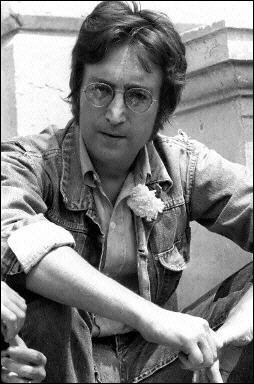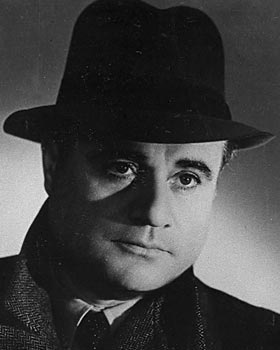|
SATURDEE OPRY LINKS 56:
Christmas Edition!
 
John Lennnon
Beniamino Gigli
Christmas Opry Links Overture!
"Hansel und Gretel," by Humperdinck. (A Christmas operatic perennial.)
https://www.youtube.com/watch?v=0WpLqNuOhT4
1.
"Happy Xmas (War is Over)," by St. John the Beatleist, and Yoko Ono. Isn't it a
grim statement about today's insane society that the "war is over if you want
it" chorus is often omitted from public performance, and remake by this or that
"pop star?" Too political! Can't have that! It is not omitted here. The Three
Tenors. Note: Pavarotti, born in Fascist Italy; Domingo, born in WWII Franco
Spain; Carreras, born in post-WWII Franco Spain. No wonder they sing like they
mean it.
https://www.youtube.com/watch?v=j5H9B4cvLHE
About the music:
https://en.wikipedia.org/wiki/Happy_Xmas_
2.
Beniamino Gigli sings "Panis Angelicus," by Cesar Franck, words by St. Thomas
Aquinas.
"May the Bread of Angels become bread for mankind. . ."
https://www.youtube.com/watch?v=YiGg_0Wkr-A
About the piece, translation:
https://en.wikipedia.org/wiki/Panis_Angelicus
3.
Yes, I realize that Cher and countless others have destroyed this tune, and you
are free to skip it here. But to hear it intoned as it should be is quite an
experience, and nobody tops Jussi Bjorling. The high note at the end is one of
the most emotionally shattering ever recorded. From Wiki: "O Holy Night"
(French: "Minuit Chretiens!" or "Cantique de Noël") is a well-known Christmas
carol composed by Adolphe Adam in 1847 to the French poem "Minuit, chrétiens"
(Midnight, Christians) by a wine merchant and poet, Placide Cappeau (1808–1877).
https://www.youtube.com/watch?v=ofKk_Etapq4
About the music:
https://en.wikipedia.org/wiki/O_Holy_Night
4.
It's Christmas Eve in Paris, 1830. Rodolfo, a poet, sits alone in his rude,
drafty garret, shivering. He has burned his latest work in order to generate a
little warmth. His roommates, Marcello, Schaunard and Colline (painter,
musician, philosopher, respectively), have gone ahead to the Cafe Momus in hopes
of somehow cadging drinks and/or eating and skipping the check. He is about to
join them when there is a faint, timid knock on the door. It is his frail
upstairs neighbor, the seamstress, Mimi. Her candle has gone out and she asks
him to re-light it for her. In the process, she drops her key on the floor and
they both grope around in darkness, trying to find it. Rodolfo's hand
accidentally alights on Mimi's. And with one note, Puccini brilliantly stops
everything, conveying in that note the discovery of love, and all the poignancy
of the scene---which shifts suddenly from the mundane to the sublime. Rodolfo
sings an unabashed, candid explanation of who he is---how he is poor, but a
"millionaire in spirit"---and how he has been captivated by Mimi. The greatest
love aria ever written, by turns delicate, wrenching, soaring, rhapsodic. "Che
Gelida Manina," from "La Boheme." Franco Corelli.
https://www.youtube.com/watch?v=fsULB3v5Ga4
Translation:
http://www.aria-database.com/search.php?individualAria=36
And for fun, here is a rendition that absolutely stunned in its day, by the
Polish tenor, Jan Kiepura. It would still stun today.
https://www.youtube.com/watch?v=XGI3PtkvVuA
About Kiepura:
https://en.wikipedia.org/wiki/Jan_Kiepura
5.
As Christmas Eve snow falls outside, and Rodolfo finishes his introduction, the
little seamstress, Mimi, responds just as candidly in an aria that is nearly the
equal in beauty to "Che Gelida Manina." This is the variously lilting, soaring,
rhapsodic, "Mi Chiamano Mimi" ("My name is Mimi") from "La Boheme" by Puccini,
sung here by probably the definitive Mimi, Mirella Freni. "To make lilies and roses / I like these things / That have so sweet
smell / That speak of love, of spring." When Puccini wrote Mimi's death scene,
he wept over the loss.
https://www.youtube.com/watch?v=LBhnligD0tg
Translation:
http://www.aria-database.com/translations/boheme2_simi.txt
And here is Maria Callas live in 1959 with the same aria.
https://www.youtube.com/watch?v=4B2fHjqLvmE
6.
As Mimi finishes introducing herself, oh so modestly, her pale face is suddenly
bathed in moonlight shining through the garret rooftop window. Rodolfo, utterly
captivated, turns to her and sings "O Soave Fanciulla," ("O, beautiful girl in
moonlight"), which becomes a duet of mutual love. It is, of course, one of the
most famous and cherished duets in opera. The two walk away into the night, on
their way to meet Rodolfo's friends for Christmas Eve revelry at the Cafe Momus
(where they will try to wine and dine despite lack of funds), singing "Amor,
amor, amor." Here are Jussi Bjorling and Renata Tebaldi.
https://www.youtube.com/watch?v=E0lboV9Cqxk
"I al ritorno?"
"Curioso!"
"Dammi il bracio, mia piccina."
"Obbedisco, signor."
"Che m’ami…di’…"
"lo t’amo."
Translation: (scroll down)
http://medicine-opera.com/2017/02/o-soave-fanciulla/
And here are Gigli and Licia Albanese. Albanese's studied with a contemporary
and devotee of Puccini, and her interpretations of Puccini heroines are thought
by many to have a unique accuracy.
https://www.youtube.com/watch?v=EVI_G5bGTCM
7.
Rodolfo and Mimi join their cohorts at the Cafe Momus Xmas Eve fest. Soon the
coquette, Musetta, arrives on the arm of a doddering sugar daddy---sending her
estranged beau, Marcello, into paroxysms of jealousy. Musetta rather enjoys
this, and lays it on thick with a little parading around and singing of the joy
of tantalizing men---particularly Marcello. This is, of course, Musetta's Waltz,
"Quando Me'n Vo" ("When I walk"), the best known of Puccini melodies, probably.
Every soprano loves to sing it, and it is easy to see why. Even Lucia Popp, the
great Mozart soprano, took a turn or two at it.
https://www.youtube.com/watch?v=zMmRetJMfOk
Translation:
http://www.aria-database.com/translations/boheme3_quando.txt
8.
There aren't too many clips of poor Mario Lanza singing live. Just one TV
appearance on the old program, "The Christophers" (filmed in Rome), and a brief
London Palladium concert, and that's it. Here he sings "Ave Maria," set by
Schubert, on "The Christophers."
https://www.youtube.com/watch?v=orKrgbVqzBM
History of the song:
https://en.wikipedia.org/wiki/Ave_Maria_
9.
There is an aria from Handel's "Xerxes" that I like to post on SOL once in a
while, usually with the suggestion that it be the national anthem of every
country. That is "Ombra Mai Fu," which is a paean to a tree, to nature. I never
get through it without tears. An ironic choice for Christmas Opry Links, seeing
as millions of little trees are killed for the holiday. Still, they are killed,
uh, out of, uh, love. What? Here, again, is wonderful Lucia Popp, who was given
only 54 years here. "Never was a plant more dear or loving or gentle."
https://www.youtube.com/watch?v=qZ6udPPsMss
Translation:
http://www.aria-database.com/search.php?individualAria=1022
Christmas Opry Links Final Bow:
"La Boheme" and I go back a ways. My old man used to crank it up while slamming
back Early Times Bourbon ("For when it's too late!") while my ten-year-old self
sat beside him, not really comprehending his enthusiastic explication of the
story, or all those howling voices. The opera, and the booze, were a sort of
Christmas fixture in our home, you might say. I long ago came to deeply love the
opera, have seen it many times, and never fail to be moved by it: the endless,
glorious melodies, the pour-your-heart-out singing, the crushing story. There is
no place in all of time or space---and I am not being glib---that I would rather
be than at the Cafe Momus in Paris, with Rodolfo, Mimi, Marcello, Colline,
Schaunard, Musetta, and the rest on Christmas Eve, 1830. In other words: Act 2.
Well, I looked and looked for a version of this with English subtitles. For
better or worse, I could only come up with the movie version with Rolando
Villazon and Anna Netrebko. No knock on the cast---it's just that watching a
movie, with all the cutaways and close-ups, is not like seeing this in the opera
house. I am adding the magnificent operatic production by Franco Zeffirelli
(also filmed) though it lacks the English subtitles. So this is my way of
extending an invitation to you, to join me and my friends at the Cafe Momus on
Christmas Eve. We have no money, but as you'll see, everthing works out fine.
Merry Christmas.
MOVIE VERSION: Act 2 begins at 34:39.
https://www.youtube.com/watch?v=5q0z66wkN2c
ZEFFIRELLI VERSION: Act 2 begins at 33:55.
https://www.youtube.com/watch?v=p2U4Eyd856o
JUST FOR FUN: Here is a college production of Act 2, with
subtitles.
https://www.youtube.com/watch?v=cgFFnqB5TVQ
Back to Opera Links
Back to Home Page
|



